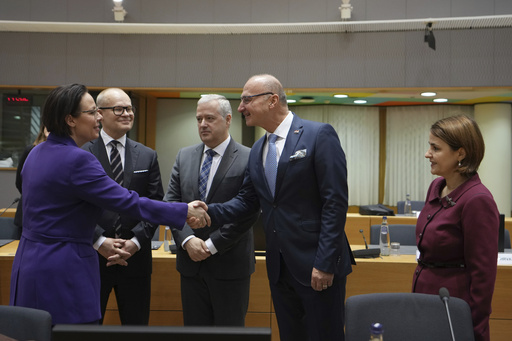BRUSSELS — On Monday, the European Union enacted new sanctions against a range of officials associated with Russia’s ongoing conflict in Ukraine. This latest round includes two high-ranking defense officials from North Korea, a military unit responsible for a striking assault on a children’s hospital in Kyiv, and leaders from various companies in the energy sector.
Additionally, the EU has targeted Russia’s extensive network of clandestine ships that the country is reportedly using to navigate around restrictions on oil and gas transport, as well as to export stolen grain from Ukraine. A total of 52 vessels have now been added to the list of ships that are barred from entering European ports or receiving services.
The EU’s foreign policy chief, Kaja Kallas, stated that this sanctions package aims to undermine Russia’s military capabilities and those who assist in sustaining its war efforts, including certain companies from China. “We will support the Ukrainian people across all dimensions: humanitarian, economic, political, diplomatic, and military,” she emphasized.
This recent wave of sanctions has led EU foreign ministers to freeze the assets of 54 individuals and 30 “entities” — terms that encompass firms, ministries, governmental bodies, or other organizations. An array of travel restrictions has also been implemented against the implicated officials.
Since Russian President Vladimir Putin initiated military actions in Ukraine in February 2022, the EU has imposed numerous sanctions. To date, over 2,300 individuals and entities have been affected by these measures.
Among those penalized is North Korean Defense Minister No Kwang Chol, who is believed to be directly involved in military collaborations, such as sending thousands of troops to Russia. Another targeted individual is Kim Yong Bok, Deputy Chief of the Armed Forces’ General Staff, who visited Russia for troop oversight.
Several firms, including Russian defense contractors, a chemical manufacturing facility, and a civilian airline that provides logistical support to the military, also faced sanctions. Moreover, several Chinese nationals accused of supplying drone components and electronic devices were included in these measures.
Entities from China, India, Iran, Serbia, and the United Arab Emirates, identified as assisting Russia in evading EU sanctions or facilitating the trade of sensitive materials used in drones and missiles, have likewise been targeted.



